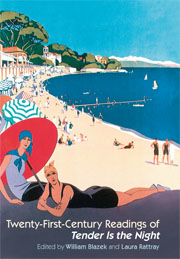Book contents
- Frontmatter
- Contents
- Acknowledgements
- List of Illustrations
- Introduction
- 1 ‘Can't We Put it in Writing?’: Some Short Precursors to Tender Is the Night
- 2 Tender Is the Night, ‘Jazzmania’, and the Ellingson Matricide
- 3 Sanatorium Society: The ‘Good’ Place in Tender Is the Night
- 4 ‘Some Fault in the Plan’: Fitzgerald's Critique of Psychiatry in Tender Is the Night
- 5 An ‘Unblinding of Eyes’: The Narrative Vision of Tender Is the Night
- 6 Si le soleil ne revenait pas: Swiss Clockwork Gone Mad in Tender Is the Night
- 7 ‘A Unity Less Conventional But Not Less Serviceable’: A Narratological History of Tender Is the Night
- 8 American Riviera: Style and Expatriation in Tender Is the Night
- 9 ‘Out Upon the Mongolian Plain’: Fitzgerald's Racial and Ethnic Cross-Identifying in Tender Is the Night
- 10 Gender Anxiety: The Unresolved Dialectic of Fitzgerald's Writing
- 11 Tender Is the Night and the Calculus of Modern War
- 12 Reading Fitzgerald Reading Keats
- Notes on Contributors
- Index
11 - Tender Is the Night and the Calculus of Modern War
- Frontmatter
- Contents
- Acknowledgements
- List of Illustrations
- Introduction
- 1 ‘Can't We Put it in Writing?’: Some Short Precursors to Tender Is the Night
- 2 Tender Is the Night, ‘Jazzmania’, and the Ellingson Matricide
- 3 Sanatorium Society: The ‘Good’ Place in Tender Is the Night
- 4 ‘Some Fault in the Plan’: Fitzgerald's Critique of Psychiatry in Tender Is the Night
- 5 An ‘Unblinding of Eyes’: The Narrative Vision of Tender Is the Night
- 6 Si le soleil ne revenait pas: Swiss Clockwork Gone Mad in Tender Is the Night
- 7 ‘A Unity Less Conventional But Not Less Serviceable’: A Narratological History of Tender Is the Night
- 8 American Riviera: Style and Expatriation in Tender Is the Night
- 9 ‘Out Upon the Mongolian Plain’: Fitzgerald's Racial and Ethnic Cross-Identifying in Tender Is the Night
- 10 Gender Anxiety: The Unresolved Dialectic of Fitzgerald's Writing
- 11 Tender Is the Night and the Calculus of Modern War
- 12 Reading Fitzgerald Reading Keats
- Notes on Contributors
- Index
Summary
Despite conventional wisdom on the topic of Fitzgerald and war – that because he was not a combatant, war therefore had little effect on him and his work – it is important to understand the ways in which he thought World War I had fundamentally and irretrievably changed Western civilization. Fitzgerald did not write combat literature that emphasizes the naturalistic aspects of modern war, as his old friend Hemingway did most notably in A Farewell to Arms (1929), but he did write one of the most engaging war novels, Tender Is the Night, about the aftermath of World War I. In this essay, I shall explore the ways in which Tender functions as a war novel, as opposed to combat fiction, differences that can best be understood when the novel is contrasted with other World War I fiction, such as Henry Barbusse's Under Fire: The Story of a Squad. Moreover, the broader social implications of war in Tender, such as Dick Diver's war neuroses, are easier to contextualize in relation to such works as Stendhal's The Charterhouse of Parma and William Makepeace Thackeray's Vanity Fair, novels about war during the Napoleonic period. I shall argue that, while in these nineteenth-century novels war is not shown as having had a lasting psychological effect on society, in Tender Fitzgerald clearly shows the lasting psychological impact of World War I.
- Type
- Chapter
- Information
- Twenty-First Century Readings of 'Tender is the Night' , pp. 192 - 203Publisher: Liverpool University PressPrint publication year: 2007
- 1
- Cited by

